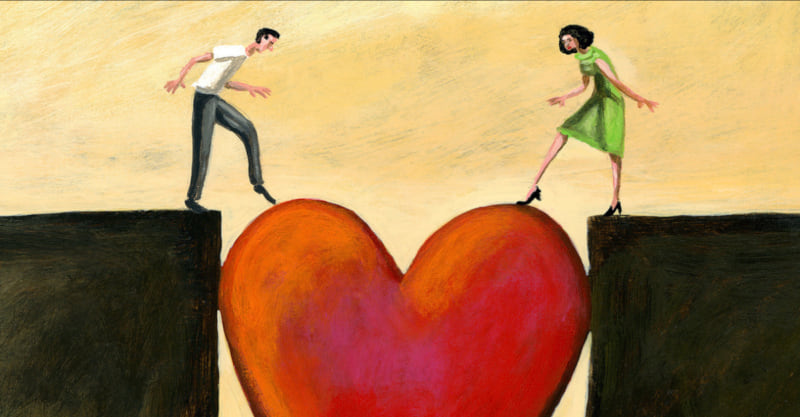

How to Move On From Someone You Still Love
When the person you once called your soulmate walks away—or when circumstances pull you apart—it can feel like the entire world has gone silent. The connection you nurtured, the dreams you shared, the comfort of knowing someone was there for you… it all suddenly disappears. And now, you're left alone in the stillness, asking yourself the inevitable question: How do I move on from this?
Losing someone you loved with all your heart is no ordinary kind of pain. It punches you in places you didn’t even know could hurt. It’s not just about saying goodbye to a person—it’s about letting go of an entire chapter of your life. And when you're in the thick of it, it's hard to imagine that you'll ever feel whole again.
At this stage, it might feel like your entire identity has been cracked open. You may struggle to accept that the relationship is really over. But even if it feels impossible now, there is a path forward. Through acceptance, emotional processing, and a commitment to healing, you can find your way back to yourself.
Before we jump into the 20 practical steps that will guide you through the healing process, it's important to understand why this kind of loss hurts so deeply. Because knowing where the pain comes from is the first step toward truly moving through it—not around it.

How Deep the Wound Goes: Why Losing Someone You Love Feels So Devastating
Desperation Becomes an Instinctive Reaction
No one prepares you for the tidal wave of desperation that hits when love walks out the door. Suddenly, you find yourself wanting to chase that person down, to rewrite the ending of your story, to do anything just to hold onto something that’s already slipping through your fingers. You might try calling them again and again, scrolling through old messages, or showing up at familiar places in the hopes of seeing them. And with every unreturned message or empty street, the ache grows.
There’s this silent hope that maybe, just maybe, they’ll realize what they’ve lost. But often, what you’re chasing isn’t just the person—it’s the security, the meaning, and the feeling of being chosen. Some people even dive into other relationships too soon, hoping that intimacy with someone else will fill the void. But these quick rebounds usually end up deepening the pain rather than healing it.
Emotional Chaos: When Feelings Hijack Your Behavior
One of the clearest signs of emotional devastation is when your behavior begins spiraling out of control. Late-night texts you regret the next morning, crying spells that last for hours, excessive drinking, dramatic confrontations—these aren’t just “bad decisions.” They’re manifestations of heartbreak trying to be heard.
In moments like this, you're seeking some kind of response from the person who left. It might be love. It might be guilt. It might be anything. You just want to be seen. But unfortunately, this emotional vulnerability can cloud your judgment and lead you to act in ways that aren’t aligned with who you truly are. That’s not because you’re weak—it’s because you’re wounded.
The Physical Toll: Heartbreak Isn’t Just in Your Head
As strange as it sounds, emotional pain from a breakup doesn’t just linger in your thoughts—it can show up in your body too. A 2011 study revealed that the brain processes heartbreak in the same regions that process physical pain. So when people say, “I feel like my heart is breaking,” they’re not exaggerating.
You might experience tightness in your chest, nausea, trouble sleeping, headaches, or even lose your appetite altogether. The pain feels real because it is real. This kind of grief disrupts your entire nervous system, making it difficult to feel grounded. That’s why it's so important to treat yourself with care—not just emotionally, but physically too.
Stuck in the Loop of the Past
It's not just the person you're missing—it's the entire timeline you shared. The restaurants you visited together, the shows you watched side by side, even the sound of a specific ringtone can send you spiraling back into the past. When everything around you triggers a memory, it becomes incredibly difficult to let go.
This pain intensifies if your lifestyle hasn’t changed since the breakup. Walking into a quiet apartment that used to be filled with their laughter. Cooking dinner for one instead of two. Running errands alone on Sundays. The echoes of the life you had together cling to your routine, keeping you tied to what used to be.
A Weight That Sits Heavy on the Soul
This kind of heartbreak isn’t just a temporary sadness—it can become a full-blown existential crisis. You start questioning your direction, your worth, even your purpose. You wonder what went wrong. You may have envisioned a shared future: marriage, children, retirement plans. Now, all of that has vanished, leaving you with nothing but uncertainty.
And the ripple effect doesn’t stop at just one person. Sometimes you lose mutual friends, cherished connections, or an entire social circle. The world feels colder, emptier, and less welcoming.
But the human spirit is designed to recover—even if it doesn’t feel like it now. There is a way forward, and the next section offers that map. With each small step, you reclaim pieces of yourself. And slowly, quietly, you begin again.

20 Steps to Truly Heal After Loving Someone Deeply
1. Let the Tears Flow — It's a Release, Not a Weakness
When your heart is aching, the first instinct might be to “stay strong,” to put on a brave face, and hide the pain. But bottling up grief only makes it heavier. You’re allowed to cry. In fact, you need to cry. Tears are not a sign of weakness; they are your soul’s way of washing out sorrow.
Let yourself grieve the relationship, the memories, the future you once imagined together. Whether it hits you during a quiet evening or while listening to a song on the radio—don't fight the wave. Let it come. Let it move through you.
After each cry, take a breath and notice how your body feels. That emotional storm might leave you tired, but oddly lighter. That’s progress—subtle, invisible progress. And sometimes, that’s the only kind that counts during heartbreak.
2. Name Your Feelings—They Need Recognition to Heal
Before you can move on, you have to know what you're feeling. And not just in a vague, “I’m sad” kind of way. Get specific. Are you feeling angry because of betrayal? Ashamed because you begged them to stay? Grieving a dream that died with the relationship? The more you label your emotions, the more power you take back from them.
This is where journaling can become your secret weapon. Open a notebook and pour it all out—raw, messy, uncensored. By doing this, you're not just venting; you’re witnessing your own healing. You begin to see patterns in your triggers, and that awareness gives you leverage.
Remember, your feelings aren’t wrong or shameful. They’re signals from your psyche, telling you where it hurts. Listen to them without judgment.
3. Accept That It’s Over—Even If Your Heart Still Hopes
This might be the hardest step of all: coming to terms with the finality of the breakup. You might still cling to hope, daydreaming about a magical reunion or imagining a sudden apology from your ex. But in order to move on, you have to release the illusion that things can go back to how they were.
You can’t change what happened. The relationship ended. And though the grief feels unbearable, the truth is that acceptance is a gift you give yourself—not a punishment. It’s the doorway to your recovery.
Stop asking why it ended. Start asking what now? That shift alone can start to return power to your present.

4. If You Can’t Forgive Them Yet, Begin by Forgiving Yourself
Maybe you feel like you could’ve done more. Maybe you regret staying too long, or not fighting hard enough. Maybe you said something you now wish you could take back. All those internal “what ifs” become chains around your heart.
But here’s the thing: you were doing your best with the information, emotions, and tools you had at the time. You didn’t plan to get hurt. And you certainly didn’t plan to hurt anyone else. Whatever mistakes were made—by you or by them—they don’t define your worth.
Start by forgiving yourself. You’re not broken. You’re human. And humans are always learning.
5. Once You're Ready, Give Yourself the Green Light to Heal
Healing doesn’t begin on its own. You have to choose it. You have to say, “Yes, I want to feel better.” That conscious permission unlocks something powerful inside you.
Ask yourself: Am I ready to let go? If your heart says yes, even just a little, that’s enough to start.
From there, create rituals around healing. Meditate in the mornings. Take long walks with music that lifts your mood. Make tea before bed and journal your thoughts. These small acts aren’t pointless—they’re your scaffolding. The more you show up for yourself, the sturdier you become.
Also, don’t underestimate your support system. Reach out to people who uplift you. Surround yourself with energy that feels safe and kind.
6. Honor the Past Without Being Held Hostage By It
What you shared with that person mattered. It had weight, meaning, beauty. Denying that won’t help you heal—it’ll only make the grief feel invalid. So instead of pretending the past didn’t exist, honor it. But don’t let it define your future.
You can reflect without replaying. You can acknowledge what you learned without reopening the wounds. And you can cherish the moments without believing they were the only good ones you'll ever have.
The past helped shape you—but it doesn’t have to hold you.
7. Ditch the Blame Game—It Keeps You Chained
Blaming your ex may feel justified, especially if they wronged you. But hanging onto that blame is like drinking salt water—it only intensifies your thirst for closure.
When you seek apologies or accountability from someone who can’t or won’t give it, you rob yourself of peace. The truth is, they don’t have to admit they hurt you in order for you to heal.
Feel your anger. Write it out. Scream it into a pillow if you have to. But then let it go. Your healing can’t wait for their conscience to catch up.

8. Clear Out the Physical Reminders
That hoodie they left behind. That framed photo of the two of you on vacation. That playlist you made together. These items seem harmless… until they catch your eye and reopen the wound.
Do a sweep of your space. Anything that tugs at your emotions or keeps you tethered to the past should be boxed up or donated. If something belongs to them and you want to return it, do so—but don’t use it as an excuse to reconnect.
This is about reclaiming your space—physically and energetically. Make room for what’s next.
9. Cut Off Contact—Even If It Hurts at First
Let’s be honest: keeping in touch with your ex rarely leads to healing. Even if the conversations are “friendly,” they usually stir up feelings of longing, confusion, or hope.
If you're still emotionally raw, go no-contact. Block, mute, delete—whatever it takes to protect your peace. You don’t need to announce it. You just need to do it.
If you must stay in contact due to shared responsibilities or co-parenting, set clear boundaries. Keep the communication direct, brief, and emotionally neutral.
10. Move Your Body—It’s Medicine for Your Mind
When your heart is broken, your body often carries the weight. That’s why physical activity can be so powerful. Movement becomes a way to process pain without words.
You don’t have to become a gym rat overnight. Just start small. Go for a walk. Try a YouTube yoga class. Punch a bag. Dance in your kitchen. Swim, hike, stretch—whatever makes you feel in your body again.
Exercise releases endorphins—those lovely little chemicals that make you feel better. It also gives you structure and something to look forward to, even if just for 30 minutes a day.

11. Declutter Your Surroundings — A Cleaner Space, A Calmer Mind
There’s a strange connection between our physical environment and our emotional state. When you're surrounded by piles of clutter, dirty dishes, or scattered belongings, it reinforces the sense of inner chaos you already feel.
Start small: clean your desk, make your bed, donate old clothes, vacuum the floor. As you sort through things, you’ll also be symbolically sorting through the emotional mess left behind by the breakup.
While you’re at it, separate items into three piles: keep, donate, and trash. Give yourself the satisfaction of letting go—physically and emotionally—of things that no longer serve you. Each drawer you organize, each surface you wipe clean, becomes an act of quiet self-respect.
12. Take Small, Steady Steps—One Day at a Time
Healing doesn’t come all at once. You won’t wake up one day and suddenly feel “over it.” More often than not, it happens gradually—so subtly, in fact, that you may not notice until one day you laugh at something and realize it didn’t remind you of them.
Take it day by day, hour by hour if you have to. Focus on manageable actions: eat a good breakfast, go for a short walk, text a friend, read a page of a book. Don’t force giant leaps of progress. Instead, value the quiet wins.
Your healing isn’t a race. It’s a quiet unfolding. And each small, intentional action brings you closer to peace.
13. Be Gentle With Yourself and Stay the Course
There will be days when you feel strong—and others when you slide right back into sadness. That doesn’t mean you’ve failed. It means you’re human.
Healing isn't linear. It zigs and zags. Some weeks you'll feel like you're flying forward; other times, like you’re crawling. That’s okay. Stay kind to yourself during the setbacks. They’re part of the process, not a detour from it.
Most importantly, don’t abandon yourself. Don’t tell yourself you’re “stupid” for still hurting. Remind yourself that you're doing the hard work of becoming whole again—and that alone is a powerful act of courage.
14. Shift Your Focus to the Now
The mind loves to replay old scenes and rewrite “what ifs” like an emotional screenplay. But obsessing over the past doesn’t change it. It just keeps you stuck.
Start training your mind to notice the present moment. What are you feeling right now? What do you see, hear, smell? Breathe deeply. Ground yourself.
Practicing mindfulness doesn’t mean you forget the past. It just means you choose to stop living there. With practice, you'll begin to see beauty in the now—and realize that your life still has space for new joys, new growth, and new stories.
15. Let Hope for the Future Gently Return
This may sound impossible in the early stages of heartbreak, but there will come a time when you can imagine a new chapter—and maybe even look forward to it.
Your breakup doesn’t mean the end of love in your life. It just means one story has closed so another can begin. You get to write this next one from a place of deeper wisdom and self-awareness.
Make plans for your future—not just romantic ones, but personal ones. What dreams did you put on hold for the relationship? What goals do you want to pursue now, for you? Build a vision that excites you.
16. Mine the Experience for Lessons
No matter how painful the relationship was—or how abruptly it ended—there’s always something to learn. Reflect on the dynamics: What did the relationship reveal about your needs? Your boundaries? Your values?
Write down the patterns you’ve noticed, both good and bad. This isn't about self-blame—it’s about self-knowledge. Think of it as emotional training for the next season of your life.
And don’t just focus on the negatives. Remember the good things too. You chose that person for a reason. Understanding that reason can help you make better, more aligned choices in the future.
17. Keep Your Heart Open to New Love—Eventually
After a significant heartbreak, the thought of opening your heart again might feel terrifying. You may want to swear off dating forever or vow never to trust anyone again. But love, real love, is still possible for you. That door isn’t closed.
Take your time. Don’t rush. But don’t shut yourself away from the possibility of meaningful connection. Healing and readiness are quiet companions—they build slowly in the background.
One day, you'll meet someone who makes you laugh again. Someone who respects your healing, who sees your scars and loves you more for them. That future exists. Leave the door unlocked.
18. Find Strength in Your Inner Circle
When the one person you leaned on emotionally is gone, your world can feel hollow. But you’re not alone. Look around: your friends, family, siblings, even that one coworker who always makes you smile—they’re still here.
Lean on them. Talk to them. Let them carry you for a while if you can’t carry yourself. There’s something sacred in being reminded of who you are by people who knew you long before the heartbreak.
And let them remind you that your identity is so much bigger than the relationship you lost.
19. Rebuild a Loving Relationship With Yourself
Somewhere along the way, you may have forgotten how to love yourself. You gave so much of your emotional energy to another person that your inner self got neglected.
Now’s the time to reconnect with you—to remember what brings you joy, what makes you laugh, what kind of music makes you dance like a maniac. Buy yourself flowers. Take yourself to the movies. Write yourself a love letter.
Self-love isn’t just about spa days and bubble baths. It’s about treating yourself with tenderness, respect, and patience. You deserve that kind of love—and you’re fully capable of giving it to yourself.
20. Seek Professional Help If the Pain Becomes Overwhelming
There’s no shame in needing support. If your grief feels too heavy to carry alone—if you can’t sleep, can’t eat, or are battling intense sadness for months—it may be time to talk to a therapist or counselor.
Therapists are trained to walk you through the darkest parts of grief. They help you identify emotional wounds, provide techniques for processing pain, and create safe space for healing.
Even support groups can be transformative. Sharing your story with others who are navigating similar heartbreaks can validate your experience—and remind you that you’re not alone in your suffering or your recovery.
Let Life Rebuild You
You loved deeply. And now you’ve lost deeply. That pain is real—and so is your strength.
This journey isn’t about pretending it didn’t happen or rushing to feel better. It’s about honoring the loss, giving it space to breathe, and choosing—day by day—not to let it define the rest of your life.
The steps above are not a magic solution. But they are a steady path. Some days you’ll walk fast. Other days you’ll crawl. What matters is that you keep moving.
And when you do, you’ll slowly remember who you were before the pain—and begin to imagine someone even stronger emerging from it.

